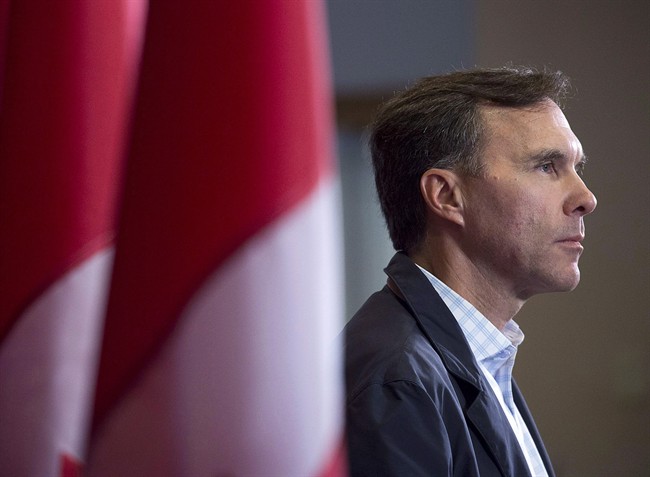Finance Minister Bill Morneau really doesn’t want to talk about what happens if the North American Free Trade Agreement (NAFTA) tanks.

In Toronto on Thursday, Morneau gave a joint press conference with José Antonio González, the recently appointed Mexican Secretary of Finance and Public Credit, in which the Canadian finance minister was asked repeatedly what will happen if U.S. President Donald Trump nukes the agreement. Morneau offered little in terms of clarification on what Canada is doing to prepare.
READ MORE: Donald Trump says terminating NAFTA would yield the ‘best deal’ in renegotiations
“We’re very focused on what I call our Plan A,” Morneau told reporters. “That is absolutely our direction. We, of course, plan for every scenario, but what we really do is focus on how we can get to an agreement that’s going to work for all Canadians.”
The follow up question, as might be expected, was concise: what is Plan B?
Morneau dodged the question.
“We recognize in any discussion with a partner, what we’re trying to do is constructively get to an answer that is positive,” he said. “That is squarely what we’re focused on.”

WATCH ABOVE: ‘Canadians are really frustrating’: Paul Ryan on NAFTA negotiations
Reports two weeks ago that Canadian officials were increasingly bracing for an American withdrawal from NAFTA sent stocks and the loonie tumbling.
That uncertainty was among the topics of conversation on the table Thursday as Morneau and González met with business leaders from the mining and financial sectors, just days ahead of the sixth round of NAFTA negotiations set to kick off next week in Montreal.
READ MORE: Justin Trudeau remains optimistic on NAFTA: ‘We know that there is a good deal to be had’
With five rounds of discussions under their belts, negotiators will be turning their attention to major demands — and potential poison pills.
The inclusion of a five-year sunset clause and weaker dispute resolution mechanisms are among the hard line concessions Canada is vehemently against.
However, a lack of progress on them could be an excuse for Trump to dump the agreement.

WATCH ABOVE: Trump playing ‘Russian roulette’ with NAFTA talk threats: former ambassador
Morneau used the press conference to stress that while the negotiations over NAFTA are creating concerns about the future for businesses, Canada is in a strong position to weather the uncertainty.
He said the government has been looking at the economic impacts of the discussions, but when asked whether he had seen economic data on what a NAFTA withdrawal could do to the Canadian economy, Morneau said little.
“That’s a confidential part of our analysis,” he said.
Reporters tried again, asking whether officials were running models on what could happen in the event of a withdrawal.
“The job of the Department of Finance is to run models on everything,” Morneau said, noting the best thing to do is to “be prepared, be ready to have constructive discussions and understand the impacts potentially both positive and challenging that any discussion can present.”
The brief press conference ended shortly after.
- Budget 2024 failed to spark ‘political reboot’ for Liberals, polling suggests
- Train goes up in flames while rolling through London, Ont. Here’s what we know
- Peel police chief met Sri Lankan officer a court says ‘participated’ in torture
- Wrong remains sent to ‘exhausted’ Canadian family after death on Cuba vacation




Comments